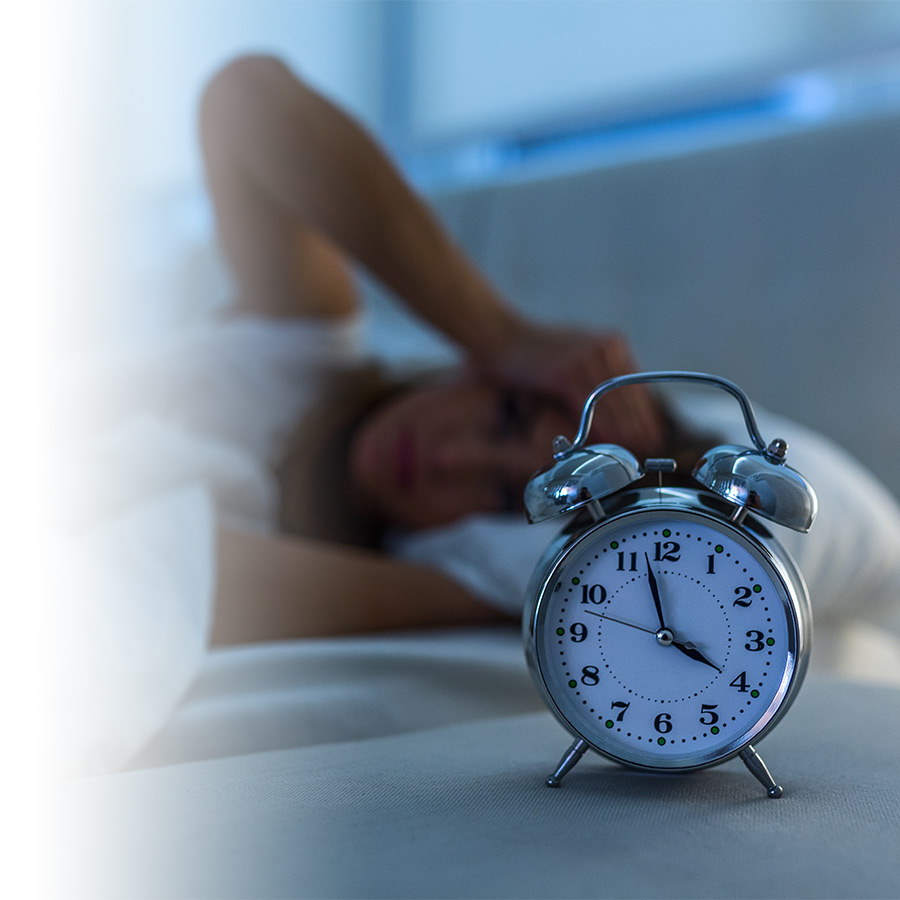Do you struggle with insomnia? Always ask your pharmacist for advice before using any over-the-counter sleep aids, as some products may not be suitable for you.
An estimated 25% of Canadians experience symptoms of insomnia. What are the causes and how can they be resolved to restore normal sleep?
What are the symptoms of insomnia?
Sleep disorders can manifest themselves in a host of different ways, including:
- difficulty falling asleep or staying asleep
- disrupted sleep
- waking up too early
- difficulty getting back to sleep when awakened at night
- apprehension about sleep (worrying about not getting a good night's sleep)
What causes insomnia?
Insomnia is first and foremost a symptom, not a disease. Before considering treatment, we must first try to identify the causes.
Chronic or transient insomnia? An important distinction.
Transient insomnia
Insomnia can be transient and situational. This is a temporary situation related to a one-time event. Most of the time, transient insomnia lasts only a few days. When things return to normal, insomnia goes away on its own. If it persists, it can be considered a more serious problem. It can be related to certain situations, such as:
- unfavorable environmental conditions (noise, heat, excess light, etc.)
- a change of routine
- a period of transition or adversity
- relational or professional concerns
- occasional health problems (backache, cold, digestive issues, etc.)
- certain medications
- pregnancy
- etc.
Chronic insomnia
Insomnia is considered chronic when sleep difficulties occur at least 3 nights a week for more than 3 months. This can have far-reaching consequences, including a deterioration in well-being, functioning, and quality of life. If your insomnia persists and you don't understand its origin, we encourage you to seek the advice of a healthcare professional to try to clarify the situation, so that it can be resolved quickly.
What illnesses or factors cause insomnia?
Chronic insomnia can be caused by a number of factors or illnesses such as:
- a mental health disorder (anxiety disorder, depression, bipolar disorder, etc.)
- asthma
- sleep apnea
- musculoskeletal pain
- hyperthyroidism
- a particular physical condition (injury, menopause, pregnancy, etc.)
- a changing lifestyle (e.g. night shifts, atypical work schedule)
- substance use (alcohol, marijuana, cocaine, amphetamines, etc.)
It is important to try to identify the causes of your insomnia so that you can receive appropriate treatment tailored to your situation.
When should you be concerned about insomnia?
After a night of insomnia, it's normal to experience uncomfortable symptoms such as fatigue, focusing or concentrating, irritability, anxiety, a of loss of energy or interest, and difficulty going about your daily activities.
Difficulty falling asleep, or fewer hours of sleep, is generally considered insomnia when it interferes with daily activities or causes a significant degree of discomfort or suffering.
What medications can cause insomnia?
Insomnia may be caused by medication. Here are a few examples of drugs that can cause this type of side effect:
- over-the-counter oral decongestants
- oral cortisone
- certain antidepressants
- psychostimulants
- beta-blockers
- etc.
Speak to your pharmacist if you feel that a medication you are taking is preventing you from getting a good night's sleep. They will be able to give you advice, and possibly suggest beneficial changes to your treatment.
How to beat insomnia?
In the event of insomnia, the first thing to do is to review lifestyle habits and aim for better sleep hygiene. Then, you can seek treatment for insomnia if the solutions you've implemented don't resolve the situation.
Insomnia treatment requires a rigorous assessment by a healthcare professional. It is based on identifying the factors involved, and then managing them. It's always preferable to resolve insomnia without resorting to medication, but this isn't always possible.
Prescription drugs: a last resort
The use of prescription drugs should always be considered a last resort. The lowest effective dose should always be used, and for the shortest possible period of time. Some prescription drugs used to treat insomnia can be habit-forming or addictive. This dependence means that you need a higher dose to obtain the same long-term effects. This is why their use should always be considered with caution.
Over-the-counter medications
Over-the-counter medications are also available, such as those containing diphenhydramine. These products should be used to treat transient insomnia, not long-term insomnia.
Natural products to treat insomnia
Natural products, such as melatonin, valerian and passionflower, are also an interesting option, as the risks of side effects or dependence are generally lower. Always ask your pharmacist for advice before using any over-the-counter sleep aids, as some products may not be suitable for you.
Other non-drug methods to consider for overcoming insomnia
There are a number of non-drug methods that can help you improve the quality of your sleep:
- psychotherapy
- relaxation
- meditation
- biofeedback
- acupuncture
- regular physical exercise
- yoga
- etc.
How many hours of sleep should you get a day?
Getting a good night's sleep has a significant impact on our health and provides us with the energy we need to function. During sleep, our bodies perform various functions:
- Liver and muscle tissue regenerate
- the immune system restores its strength
- memory is consolidated
- growth hormone secretion is highest during sleep
- the brain eliminates waste owing to antioxidants
|
Age group |
Recommended hours of sleep per day |
|
0 to 2 months |
16.5 to 18.5 |
|
2 to 12 months |
14 to 15 |
|
12 to 18 months |
13 to 15 |
|
18 months to 3 years |
12 to 14 |
|
3 to 5 years |
11 to 13 |
|
5 to 12 years |
9 to 11 |
|
Adolescents |
8.5 to 9.5 |
|
Adults |
7 to 9 |
Don’t hesitate to speak to your pharmacist if you have questions about your sleep.

